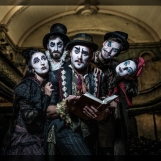‘Intangible Heritage’
Date: Friday 17 May 2019
|
TaPRA History & Historiography working group Interim Event: ‘Intangible Heritage’ Friday 17th May 2019, 9:30-17:00, at the Performance Lab, Sheffield Hallam University Join us for a day of discussion exploring the relationship between current research methodologies and tangible/intangible heritage in contemporary practice and performance historiography. In 2003 UNESCO defined “intangible cultural heritage” as the ‘means the practices, representations, expressions, knowledge, skills – as well as the instruments, objects, artefacts and cultural spaces associated therewith – that communities, groups and, in some cases, individuals recognize as part of their cultural heritage. This intangible cultural heritage, transmitted from generation to generation, is constantly recreated by communities and groups in response to their environment, their interaction with nature and their history, and provides them with a sense of identity and continuity, thus promoting respect for cultural diversity and human creativity.’ Such ‘intangible heritage’ UNESCO contends is manifest in: (a) oral traditions and expressions, including language as a vehicle of the intangible cultural heritage; (b) performing arts; (c) social practices, rituals and festive events; (d) knowledge and practices concerning nature and the universe; (e) traditional craftsmanship. https://ich.unesco.org/en/convention Subsequent works such as Smith and Akagawa,(2009), Harrison, (2011), Jackson and Kidd, (2011), Pietrobruno, Gavin (2013), Ott and Pozzi (2015), Taylor (2016), and Ishiguro (2018), have explored the scope, tensions and possibilities that exist around conceptualizations of heritage while organisations such as Arts Council England and the Heritage Lottery Fund regard ‘intangible heritage’ as an increasing imperative in their grant allocations. For The Machinery Caroline Radcliffe and Sarah Angliss have collaborated to create a contemporary, live performance of Pat Tracey’s original clog dance, (the steps for which Pat herself has traced back to pre-1820). The piece mixes dance steps with music and video to reflect the conditions of women’s repetitive labour and the human/automaton relationship created by the Industrial Revolution and described by Marx in Das Kapital (1867). Together, Radcliffe and Angliss filmed and recorded the working machinery at Quarry Bank cotton mill, juxtaposing clog dancing with the repetitious script of a contemporary call-centre and the overwhelming sounds of the cotton machines to create a performance that brings to the fore the intricate relationships between the industrial vernacular and technologies of the nineteenth and twenty-first centuries. Part of the project is to relate it to the creative response of workers to the industrial revolution and how, by performing the workplace, they coped with it. More recently The Machinery has been recreated for Ironbridge Gorge Museums, (2018) as a large-scale immersive audio/visual installation by Jon Harrison with support from the Arts Council England, the University of Birmingham and Ironbridge Gorge Museums. Radcliffe, Harrison and Angliss’ The Machinery engages with the recovery of ‘intangible heritage’ as well as the History and Historiography working group’s ongoing theme of ‘Industry Professionals/Professional Industry.’ As such, our interim event will feature a screening of The Machinery, accompanied by a presentation from Caroline Radcliffe and Sarah Angliss. Our afternoon discussion will be framed around pre-circulated reading and invited provocations based on individual experiences of working with/from intangible heritage. For further info re The Machinery, please see: https://www.youtube.com/watch?v=LeoWj8DJL4Y https://www.youtube.com/watch?v=naCDVVKA724&feature=youtu.be If you’d be interested in attending our interim event please contact Hayley Bradley and Lucie Sutherland at theatrehistory@tapra.org We also invite applications for up to two postgraduate student travel bursaries for this event (£100.00 to be made available, which will form a contribution to travel costs). Postgrads wishing to be considered for a bursary should write to the conveners explaining how and why the event would benefit their current postgraduate study. Please note: TaPRA interim events are open to both existing and new members. If you’re not already a TaPRA member you will need to join the TaPRA membership in order to attend. TaPRA membership can be obtained at: http://tapra.org/join-tapra/ We’d also encourage you to sign up to the working group via the TaPRA website and please see our CfP for the September 2019 conference (deadline for proposals is Monday 8th April) on ‘European Legacies and Connections’: http://tapra.org/call-participation/tapra-2019-surrey-history-historiography-wg-cfp-industry-professionalsprofessional-industry-european-legacies-and-connections/ Suggested reading: Findlay, G. (2013). Mapping Tangible and Intangible Cultural Heritage: The Splinters Archive Project. Australasian Drama Studies, 113–129. Retrieved from http://search.proquest.com/docview/1424374995/ Harrison, R. (2011). Intangible heritage embodied and Intangible heritage. International Journal of Heritage Studies, 17(3), 280–282. https://doi.org/10.1080/13527258.2011.557864 Ishiguro, M. (2018). Malay Theatre: Intangible Cultural Heritage and Islam: Wayang Kulit Kelantan and Mak Yong by Kathy Foley and Patricia Hardwick, and: Tradition in Transition: Intangible Heritage in South and Southeast Asia. Asian Theatre Journal, 35(1), 216–221. https://doi.org/10.1353/atj.2018.0024 Jackson, A & Kidd, J. (2011). Performing Heritage. Manchester: Manchester University Press. Ott, M., Dagnino, F., & Pozzi, F. (2015). Intangible Cultural Heritage: Towards collaborative planning of educational interventions. Computers in Human Behavior, 51, 1314–1319. https://doi.org/10.1016/j.chb.2014.11.039 Radcliffe, C., & Angliss, S. (2012). Revolution: Challenging the automaton: Repetitive labour and dance in the industrial workspace. Performance Research, 17(6), 40–47. https://doi.org/10.1080/13528165.2013.775758 Pietrobruno, S. (2013). YouTube and the social archiving of intangible heritage. New Media & Society, 15(8), 1259–1276. https://doi.org/10.1177/146144481246959 Smith, L.S & Akagawa, N. (2009). Intangible Heritage. London: Routledge. Taylor, D. (2016). Saving the “Live”? Re-performance and Intangible Cultural Heritage. Études Anglaises, 69(2), 149–161. Retrieved from http://search.proquest.com/docview/1841298542/ |

